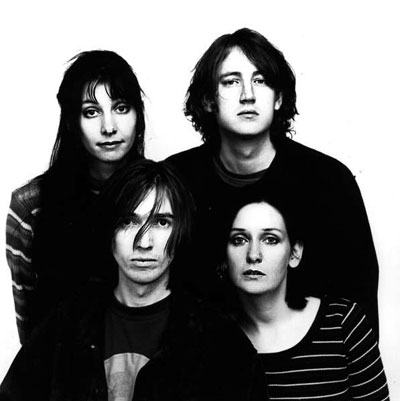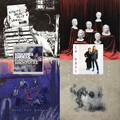David o' Riordan írása
The announcement a few months ago of a My Bloody Valentine gig in Budapest was, apart from anything else, a novel development. The half-Irish, half-English (with a smidgen of American) band's considerable influence on pop music in the last 20 years, and their role as innovators etc. is something appreciated, for the most part, in the Anglophone countries; their profile in Hungary – and I would guess Central Europe in general – is especially low. (Though singer/guitarist Kevin Shields – maker of virtually all the band's music in the studio – may have entered the conscience of the odd young Magyar with his contributions to Sofia Copolla's 2003 film, Lost In Translation.) A relatively small scale setting thus seemed inevitable. That the gig would be in Club 202, in the awkwardly-located south Buda suburb of Albertfalva (metropolitan myopia, why not?), a venue devoted largely to the hosting of heavy metal concerts, added to the intrigue. (Indeed, looking through the schedule of the venue's recent gigs, I was heartbroken to see that I had missed a double bill of Septic Flesh and Flesh God Apocalypse. One wonders if the venue agreed to host MBV, simply because of the word, "bloody" in their name.)
Facile condescension towards heavy metal clubs aside, the news of the gig was a source of great pleasure to the present writer, a long-time obsessive fan of the band – and a deracinated muck savage living in Budapest – who, up until recently, would have considered such an occurrence to be a remote utopia, equivalent to a nine-day töltött káposzta festival at Városliget, at which Fábry Sándor would serenade all present with atonal reworkings of Verdi arias. I had seen MBV previously in 2008 at the Electric Picnic festival in Ireland, the time of their comeback after over a decade and a half of inactivity. This year's tour was given an added sense of purposefulness by the arrival in February of MBV, the band's first album in 22 years – an event of such great import in Hungary, that Viktor Orbán had two tram stops renamed in honour of the occasion.
There were a few potential spanners in the works. The floods all across central Europe did for a time seem to form a potential obstacle to the gig taking place. And on the day of the concert, word came through that the previous night's concert in Bratislava was cancelled, cause one of the band's road crew broke his leg during rehearsals. Indeed, MBV singer/guitarist Bilinda Butcher sent her well wishes to the roadie before the last song at the Club 202 gig. I'm willing to take this at face value; and accept that the cancellation was not, in fact, an act of latent protest on the part of the band against the perennial injustice of the Trianon treaty.
After sneaking a listen to the soundcheck an hour previously – and being mildly harassed by the staff for doing so – we headed in to the gig for 7pm. Knowing, as I did, not a single Hungarian who had even heard of the band before the gig, one of the curiosities was seeing what the makeup of the audience would be. It was predominately young, which wasn't a great surprise. I can't imagine there were too many fellas, back in the late 80s, getting copies of Isn't Anything smuggled into the country in return for providing one of Kádár János'nieces with sexual favours.
The reaction to the support band, Collaps' set, during which not a single person in the sparsely-populated venue moved anywhere near to the stage, was enough to induce a certain apprehensiveness that the gig would turn out to be a damp squib; and the advertisements for the gig, referring to the "legendás zenekar", would give way to untold levels of bathos.
Even at the time, however, there were reasons not to be so pessimistic. The main one was that the music of Collaps was stupendously nondescript, a dreary Unknown Pleasures-meets-Hatful of Hollow bowl of tedium, and if anyone had gone up to the stage to engage with this, I would have marked that person down as lacking all discrimination. That being said, they weren't overtly wretched, and crippling ennui set in – at least for me – only after three or so songs.
During the interval, mercifully, the venue started to fill up to a gluttonous extent. Magyar youth in full flow. And when Shields, Butcher, Googe and Ó Cíosóig – and a lass named Jen, their extra guitarist and keyboardist, newly-recruited for this tour – came on stage, they were given the most of passionate of welcomes, with chunks of goulash meat and Hortobágyi palacsinta flying everywhere. (This may be a distortion from memory.)
They began with "I Only Said". As soon as Mr. Shields started bending that tremolo...let's just say, there are few things in life more reassuring! This was quickly followed by "When You Sleep", and Shields and Butcher's inimitable, generation-defining – Janeane-Garofalo-wearing-a-tea-cosy-in-a-wooden-panelled-vegetarian-restaurant-somewhere-in-New-York-in-1993 – harmonies. Again supremely blush-inducing. Then came, "New You", the highlight of this year's new album. It was during this performance when it dawned on me that Ms. Butcher – always a deeply stellar-looking individual – has with time developed a certain buttered scones/piano lessons gentility about her person, enhanced in this instance by her singing sans guitar. "New You" – a marriage of standard MBV tremolo-bending and poppy, almost Bacharach-like melodic grace – complemented this aesthetic to very edifying effect.
For a band so heavily associated with the studio, it is perhaps inevitable that live reproduction sometimes falls short. "To Here Knows When" was a little bit too mannered, lacking the carnality of its studio counterpart – noise pop for the buttered scones/piano lessons brigade in a less salutary way than that mentioned above. "Only Shallow", however, though lacking some of the sonic distinctiveness of the original, was divinely, dementedly messy, the chaos of the instrumental section contrasting supremely satisfyingly with Butcher's cooed verses. (Again, occasional flashes of Garofalo's tea cosy here.)
Despite the relatively small stage, the band's on-stage dynamic remained as it always was. Apart from guitar-playing and singing, Shields and Butcher were almost motionless, with most of the animation coming from the rhythm section. Drummer Colm Ó Cíosóig was particularly enjoyable to watch, so immense was the rage on his face with virtually every drum fill. I believe it was during "Feed Me With Your Kiss" – the MBV song probably most stylistically congruent with Club 202 – that one of his drumsticks flew out of his hands.
There were some pleasant surprises in the setlist – "Honey Power", "Cigarette in your Bed" – as well as some mildly irritating absences – "Lose My Breath". Someone in the crowd repeatedly shouted for "Sometimes", suggesting a familiarity with the back catalogue, and making it seem less likely that all the Hungarian members of the audience were merely recruited by a PR agency for the band.
The centrepiece of the band's set is always the closer, "You Made Me Realise", in the middle of which the band play one chord over and over again, with increasing volume, for an untold length of time. I don't know how many people in the audience knew about this aspect of the set. I did see on the Facebook page of the gig beforehand, someone writing – like a Hungarian version of Nathan Barley – "Bring on the MBV noise apocalypse!", so perhaps it was relatively common knowledge. I've heard accounts of this going on for over half an hour. On this occasion, I would say it was probably less than ten minutes. Perhaps the band are getti ng on in years – a few too many crooked teeth, a few too many sentimental brandies with Uncle Seamus on New Year's Eve. But nonetheless, during the one chord, Uncle Seamus was the furthest thing from my mind and – I would wager – most people at this gig's minds. There are many trite things one could write, when trying to describe this – "sonic hurricane" etc. So, in seeking to avoid cliché, and with no regard for descriptive accuracy, I will say that it sounded like someone stirring a cake mixture in a room full of gongs. They then launched back into the third and final verse of the song, the end of the one-chord onslaught gaining jazz concert-like applause from the audience.
ng on in years – a few too many crooked teeth, a few too many sentimental brandies with Uncle Seamus on New Year's Eve. But nonetheless, during the one chord, Uncle Seamus was the furthest thing from my mind and – I would wager – most people at this gig's minds. There are many trite things one could write, when trying to describe this – "sonic hurricane" etc. So, in seeking to avoid cliché, and with no regard for descriptive accuracy, I will say that it sounded like someone stirring a cake mixture in a room full of gongs. They then launched back into the third and final verse of the song, the end of the one-chord onslaught gaining jazz concert-like applause from the audience.
With the gig over, in my elation, I had nothing to do but unsuccessfully try and engage some strangers in discussion of it, before heading off for post-concert beers and smugness. The Hungarian music magazine, Recorder, made the quite reasonable assertion that this was MBV's first and probably last Hungarian gig. Nonetheless, I think that entertaining the possibility of an outdoor gig in the woods of Hűvösvölgy in 2015 is not the worst thing one could do on the odd bored Sunday afternoon in the coming months.





